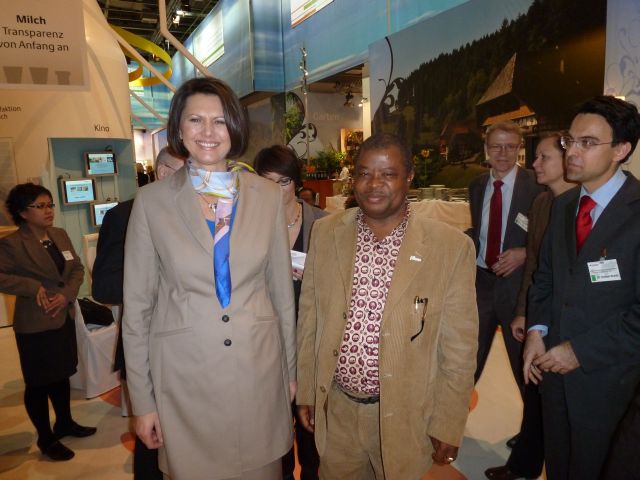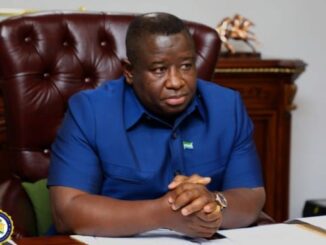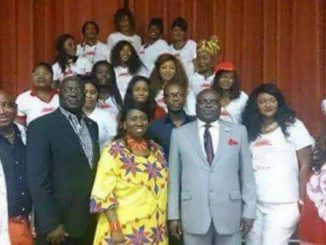Sierra Leone is a blessed country. A country blessed with multiple forms of natural resources. If riches are only measured in terms of the mineral deposits a country possesses, then this small West African nation of ours is one of the richest countries in the world.
In fact sometimes when I attend international confabs in Europe, I find myself in a dilemma – not wanting to detest claims from other delegates that my country is very rich but as well finding it difficult to explain why for so long in the past Sierra Leone ironically but prominently occupied the “one of the poorest countries on the planet” position in the international development scale.
However, the fact that most of such delegates are very well conversant with contemporary development trends in most African countries strengthened my position in such lunch-time, unofficial side discussions. Sierra Leone has been a success story in post-war reconstruction and development primarily because of the policies being implemented in the last seven years – the foundations for solid economic growth has been built; the present trends are positive and forecasts for economic growth look even more positive.
What is perhaps worth mentioning here which in most cases has not been in the forefront on discussions about wealth in mineral resources is that as much as they are a blessing, they could still be a curse – a point of conflict, destruction and bloodshed. This happens when there is an over-reliance on such resources as the only source of wealth creation, livelihood and economic growth:
When the farmers refused to go to their farms because they want fast riches from diamond mining; when our youths opt to go to the mines instead of schools, tertiary institutions and universities to gain education; and above all when our government fails to explore alternative ways to ensure sustainable economic growth and concentrate solely on the natural resources sector.
Well we are no strangers to what might befall a country in such circumstances. I need not delve into the over-stated fact of the causes of the Sierra Leone conflict – rampant corruption, mismanagement of and over-reliance on our natural resources and so on. What I want to bring into focus in this piece however is how the present administration has been taking strides to place more attention on agricultural development as a vehicle for livelihood and sustainable economic growth. To understand better the President and his government´s commitment to developing the agriculture sector, I want to stroll down to few years back.
During the 2008 World Food Day celebrations held in Magburaka, no less a person than President Koroma openly declared agriculture as the top priority of the Government after the energy sector. This was clearly spelt out in the “Agenda for Change” which pursued programmes that have increased agricultural productivity, promoted commercial agriculture, improved agricultural research and extension delivery systems, among others.
In addition, in support of the president´s declaration, a Presidential Task Force on Agriculture was established to take the lead in the coordination and implementation of the strategic framework for agricultural development to trigger socio-economic growth. The President is chairman of that taskforce.
This declaration was followed by increased budgetary allocation to agriculture from 2.2% in 2008 to 7.7% of the total national budget in 2009 to a further increase of 9.9% in 2010. This enhanced the implementation of the mechanical cultivation programme nationwide which resulted in extensively increasing areas under cultivation.
Furthermore, in 2009, the government with support from its partners designed the National Sustainable Agriculture Development Plan 2010-2030, a roadmap for moving agriculture, forestry and fisheries forward to both address the country’s growing needs due to population growth and to create additional income to the national economy. In the same year, to demonstrate its commitment further on 22 September 2009 the government signed the Comprehensive Africa Agricultural Development Programme (CAADP) compact, agreeing to raise the percentage of the budget spent on agriculture to 10, percent a commitment it has adhered to.
These interventions and sound government initiatives have been paying off. Earlier this year, the hardworking Minister of Agriculture, Dr. Sam Sesay, highlighted the progress made so far: Rice production has increased by 35%, cassava by 34%, sweet potato by 34%, palm oil more than double, cocoa and coffee grown by more than one-half above the status in 2007. Subsequently, the total importation of rice and other foodstuffs into the country has reduced to more than half of its former percentage and has resulted to a drop from thirty-two million United States dollars (US$32m) to fifteen million United States dollars (US$15m), the Minister disclosed.
These achievements made already will be further built on in the Agenda for Prosperity. In fact, the government placed agricultural development right at the centre of that prosperity agenda. “ Of the 5.7 billion dollars estimates to fund the Agenda for Prosperity over the next five years, over a quarter, about 1.6 billion dollars, is earmarked for the sector,” President Koroma recently revealed at a confab in Freetown.
This is not to say there have not been challenges. Certainly there are always challenges. As President Koroma himself recently reiterated, to continue to develop our agricultural sector to achieve the sound vision of Sierra Leone becoming a middle income country in 22 years, “we need to get land governance right, we need to get our monitoring and evaluation right, we need to attract more private sector investment, we need to continue the transformation of farmer financing, and more importantly we need to develop a comprehensive program for research and extension.”
These are challenging tasks! Notwithstanding, with the present political will, vision and framework that mainstream agriculture in the development agenda of Sierra Leone, those challenges will not only be overcome, but a solid pathway to sustainable economic growth is gradually being carved.





Leave a Reply